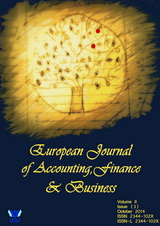|

ISSN: 2344 - 102X
ISSN-L: 2344 - 102X
Our journal is currently indexed in the following databases:
|
| |
Volume 2, Number 3, Year 2014| 1. Conferinta Internationala "Perspective in contabilitate si audit", editia II | 
Download | | Author(s): Conferinta Internationala | | DOI: | | Abstract: Conferinta a fost organizata in parteneriat cu Asociatia Internationala a Expertilor Contabili Autorizati (ACCA), Corpul Expertilor Contabili si a Contabililor Autorizati din Romania (CECCAR), Camera Auditorilor Financiari din Romania (CAFR) si a fost sustinuta de mari cabinete de audit si consultanta in contabilitate KPMG, Ernst & Young, PriceWaterhouse Coopers, ABA, de companii prezente in mediul de afaceri, precum Bosch, Quasar etc. | | Keywords: Conference, International, Timisoara, Romania, CECCAR, CAFR, ACCA |
| 2. MEASUREMENT OF FINANCIAL REPORTING QUALITY BASED ON IFRS CONCEPTUAL FRAMEWORK'S FUNDAMENTAL QUALITATIVE CHARACTERISTICS | 
Download | | Author(s): Alexios Kythreotis | | DOI: 10.4316/EJAFB.2014.231 | | Abstract: The IASB creates the standards and the conceptual framework in an attempt to create higher quality financial statements. Through this article, the extent to which this objective has been achieved is examined. An important characteristic of this research is the fact that the quality of financial statements is examined in light of the Conceptual Framework. Specifically, the two fundamental qualitative characteristics - relevance and faithful representation (reliability) - set by the IAS Committee through the Conceptual Framework are examined. Additionally, this article highlights the conflict between the existing methods for measuring reliability and the faithful representation, as defined by the Conceptual Framework. The degree of relevance and reliability is measured by the usage of four alternative regression models. The sample of this research consists of listed companies of fifteen European countries that have adopted IFRS mandatorily and the time horizon that is investigated is 10 years, from 2000 until 2009. Specifically, the period between 2000 and 2004 is defined as the period before the adoption, while the period between 2005 and 2009 is defined as the period after the adoption. Generally, the findings that are obtained support an increase in relevance, while the reliability seems to be unchanged. | | Keywords: Adoption Of IFRS; Financial Reporting Quality; Conceptual Framework; Qualitative Characteristics; Relevance; Faithfull Representation (Reliability). |
| 3. Current tendencies in enterprise performance measurement and their limitations | 
Download | | Author(s): Veronica Deac, Elena Hlaciuc | | DOI: 10.4316/EJAFB.2014.232 | | Abstract: The purpose of this research is to identify and present the latest trends in enterprise performance measurement, assessed specifically from financial point of view, respectively to provide details on the financial performance and to highlight their limitations, as well. The research is fundamental type. The Thomson Reuters Web of science database was used in order to find articles dealing with the topic of this research. The contribution of this research is the identification of the current tendencies in enterprise performance measurement, as given by a variety of empirical scientific publications on this topic, during the recent years, namely the company performance measurement and its explanation using the simple or multiple linear regression. The related limitations generated by the application of these regression equations resulted for each study sample is to be presented, as well. | | Keywords: Measuring Enterprise Performance, Financial Performance, Measurement, Influencing Variables, Uncertainty |
| 4. Impact of financial crisis on financial audit activity in Romania | 
Download | | Author(s): Ovidiu Constantin Bunget, Alin Constantin Dumitrescu, Delia Deliu | | DOI: 10.4316/EJAFB.2014.233 | | Abstract: Given the growing concerns in the current socio-economic context for obtaining more relevant and more "insuring" information on the quality of financial information provided by the financial statements of various companies, both practitioners and academics, but also regulators, are asking various questions on how external audits and audit reports are and should be looked at. Unfortunately, in recent years we face a continuous degradation of the audit image, and by default of that of financial auditors. This is due to scandals and bankruptcies of companies and financial institutions, where auditors have contributed more or less. All these led to intensified efforts of audit professional and regulatory bodies for analysing the causes of these phenomena in order to identify and impose a number of measures aimed to restore the lack of credibility occurring increasingly stronger in the results of auditors' work.
Auditors and audit companies should not overlook the social importance of financial audits in recent years - a position obtained after an effort of hundreds of years - and eventually extend their responsibilities and seek for new methods or procedures compatible with current needs in order to support their work. Therefore, audit value must be continually tested against requirements of users and society. Accounting profession must build a solid case in favour of the benefits brought by audits to business, economy and society.
Audits must evolve and expand to add more value for users. Especially for listed companies and even more in times of crisis, audits must be more than an opinion on historical financial statements. | | Keywords: Financial Audit, Financial Crisis, Credibility, Perceptions, Audit Report |
|
|
| |
|
|
|

